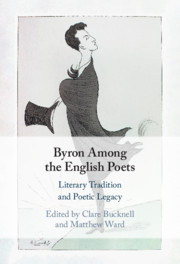Book contents
- Byron Among the English Poets
- Byron Among the English Poets
- Copyright page
- Dedication
- Contents
- Contributors
- Acknowledgements
- Abbreviations
- Introduction
- Part I Inheritances
- Chapter 1 Byron and Shakespeare
- Chapter 2 Not for Envy: Paradise Lost and the Inward Turn in Byron’s Cain
- Chapter 3 Byron and Rochester
- Chapter 4 Byron’s ‘Popifying’: Twice-Told Tales
- Chapter 5 ‘Liquid Lines’: Byron Among the Amatory Poets
- Chapter 6 Byron and Satire post-1760
- Chapter 7 Byron’s English Verse Inheritance
- Part II Contemporaries
- Part III Afterlives
- Index
Chapter 1 - Byron and Shakespeare
from Part I - Inheritances
Published online by Cambridge University Press: 22 July 2021
- Byron Among the English Poets
- Byron Among the English Poets
- Copyright page
- Dedication
- Contents
- Contributors
- Acknowledgements
- Abbreviations
- Introduction
- Part I Inheritances
- Chapter 1 Byron and Shakespeare
- Chapter 2 Not for Envy: Paradise Lost and the Inward Turn in Byron’s Cain
- Chapter 3 Byron and Rochester
- Chapter 4 Byron’s ‘Popifying’: Twice-Told Tales
- Chapter 5 ‘Liquid Lines’: Byron Among the Amatory Poets
- Chapter 6 Byron and Satire post-1760
- Chapter 7 Byron’s English Verse Inheritance
- Part II Contemporaries
- Part III Afterlives
- Index
Summary
The relation of Keats to Shakespeare seems straightforward: lifelong admiration; the desire to imitate him; delight in Shakespeare’s use of language; approval of Shakespeare’s bypassing of the ethical in order to enter myriad kinds of human experience through negative capability; and wonder at his imagined worlds. Byron’s complex, shifting and almost never straightforward relation to Shakespeare is unlike this. Yet Byron, I will argue, is more pervasively, though less devoutly, Shakespearian than Keats.
- Type
- Chapter
- Information
- Byron Among the English PoetsLiterary Tradition and Poetic Legacy, pp. 19 - 34Publisher: Cambridge University PressPrint publication year: 2021

